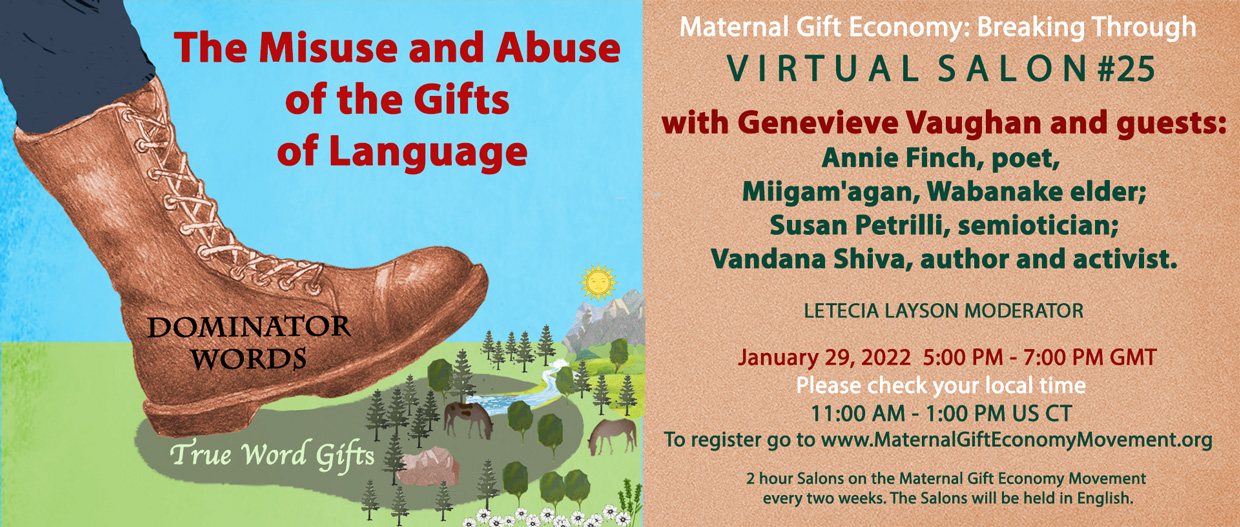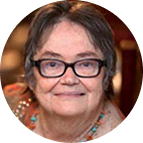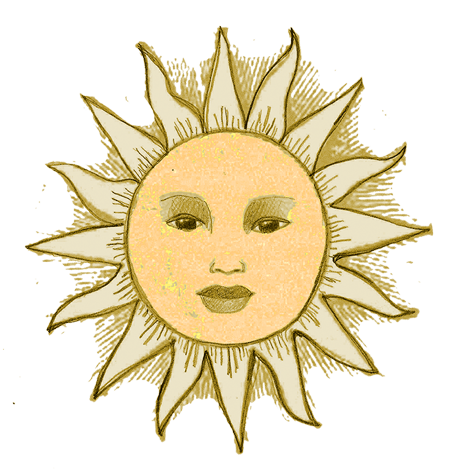Maternal Gift Economy: Breaking Through -
Ongoing Salons
Every two weeks

Maternal Gift Economy Movement - The Misuse and Abuse of the Gifts of Language
January 29, 2022
Featuring Genevieve Vaughan and guests:
Annie Finch, poet; Miigam'agan, Wabanake elder; Susan Petrilli, semiotician; Vandana Shiva, author and activist.
Moderated by Letecia Layson
Genevieve Vaughan
In the previous salon language was described as a virtual maternal gift economy using the plane of sound (or writing) as its medium. In this perspective language is an abundant economy of word gifts, which we give to each other without losing, to satisfy one another's cognitive and communicative needs. In this session we will discuss how misusing word-gifts, misnaming aspects of the world, hides and distorts the gift economy and its paradigm, which are continually present everywhere.
Some examples of this distortion are the misuse of the word 'exchange' for what is actually turn taking in gifting; the misuse of the word 'profit' to refer to the plundered gifts of surplus labor, unpaid household work and the 'services' of Nature; the misuse of word-gifts for the purpose of lying in advertising and propaganda. All this is now taking place upon the recent historical background of the destruction of indigenous populations, their lands and their languages and the imposition of colonizer and commercial languages upon colonized peoples.
Recognizing and embracing the unseen paradigm of the gift as the source of meaning in language and in life can turn us away from the dire harm many of us are still perpetrating against Mother Earth and all her children.
I have invited some honored guests to discuss all this with me (Annie Finch, poet; Miigam'agan, Wabanake elder; Susan Petrilli, semiotician; Vandana Shiva, author and activist). We will discuss the misuse of the gifts of language as the tool of patriarchy, capitalism and colonialism.
Bio
Genevieve Vaughan (b.1939) is an independent researcher who lives part time in Italy and part in Texas. She created the multicultural all-woman activist Foundation for a Compassionate Society (1987-2005) and the Temple of Sekhmet in the Nevada desert (1992 – ongoing) and she co-created the network: International Feminists for a Gift Economy (2001 – ongoing). Her books are For-Giving, a Feminist Criticism of Exchange (1997), Homo Donans (2006) and The Gift in the Heart of Language: the Maternal Source of Meaning (2015). She has edited Il Dono/The Gift (2004), Women and the Gift Economy (2007) and The Maternal Roots of the Gift Economy (2019). A volume of the Canadian Women’s Studies Journal dedicated to the maternal gift economy has just appeared (2020)
More information @ www.gift-economy.com.
Annie Finch (born October 31, 1956) is an American poet, critic, editor, translator, playwright, and performer and the editor of the first major anthology of literature about abortion. Her poetry is known for its often incantatory use of rhythm, meter, and poetic form and for its themes of feminism, witchcraft, goddesses, and earth-based spirituality. Her books include The Poetry Witch Little Book of Spells, Spells: New and Selected Poems, The Body of Poetry: Essays on Women, Form, and the Poetic Self, A Poet’s Craft, Calendars, and Among the Goddesses.
Miigam’agan is a Wabanaki/Mi’kmaw grandmother of the Jagei Clan from Esgenôpetiti/Burnt Church. She is a mother of three wonderful people and a grandmother to three beautiful grandchildren. Her life has been devoted to Wabanaki cultural revival and promoting an understanding of Indigenous matriarchal systems drawing on her language. Currently, Miigam’agan is Elder-in-Residence at St. Thomas University in Fredericton, New Brunswick. In this role, she provides support for First Nation students and offers opportunities for the students and faculty to learn from indigenous knowledge keepers. Miigm’agan sits on the Executive Committee of the Urban Aboriginal Knowledge Network at the University of New Brunswick, which sets research priorities and ensures that the research they support meets the needs of urban Aboriginal peoples. She is also a member of the steering committee on Adult Education Initiatives for the Catherine Donnelly Foundation and a co-chair for the women of First Light, an indigenous women led initiatives on adult education for social change.
Susan Petrilli (Ph.D.), Full Professor of Philosophy and Theory of Languages, University of Bari Aldo Moro, where she teaches courses in Philosophy of Language; Semiotics; Semiotics of Translation; Semiotics of Law and Intercultural translation. She is 7th Sebeok Fellow of the Semiotic Society of America, Fellow of the International Communicology Institute, Washington; past vice-President of the International Association for Semiotic Studies (2014-2020); Visiting Research Fellow, School of Psychology, Adelaide University; honorary member, Institute of Semiotics and Media Studies, Sichuan University, China. Susan has written, edited and translated many books. With Augusto Ponzio she has introduced the seminal notion of “semioethics”.
Dr. Vandana Shiva is trained as a Physicist and did her Ph.D. on the subject “Hidden Variables and Non-locality in Quantum Theory” from the University of Western Ontario in Canada. She later shifted to inter-disciplinary research in science, technology and environmental policy, which she carried out at the Indian Institute of Science and the Indian Institute of Management in Bangalore. In 1982, she founded an independent institute, the Research Foundation for Science, Technology and Ecology in Dehra Dun dedicated to high quality and independent research to address the most significant ecological and social issues of our times, in close partnership with local communities and social movements. In 1991, she founded Navdanya, a national movement to protect the diversity and integrity of living resources, especially native seed, the promotion of organic farming and fair trade. In 2004 she started Bija Vidyapeeth, an international college for sustainable living in Doon Valley in collaboration with Schumacher College, U.K.Dr. Shiva combines the sharp intellectual enquiry with courageous activism..Time Magazine identified Dr. Shiva as an environmental “hero” in 2003 and Asia Week has called her one of the five most powerful communicators of Asia.Forbes magazine in November 2010 has identified Dr. Vandana Shiva as one of the top Seven most Powerful Women on the Globe. Dr. Shiva has received honorary Doctorates from University of Paris, University of Western Ontario, University of Oslo and Connecticut College, University of Guelph.Among her many awards are the Alternative Nobel Prize (Right Livelihood Award, 1993), Order of the Golden Ark, Global 500 Award of UN and Earth Day International Award. Lennon ONO grant for peace award by Yoko Ono in 2009, Sydney Peace Prize in 2010, Doshi Bridgebuilder Award, Calgary Peace Prize and Thomas Merton Award in the year 2011,the Fukuoka Award and The Prism of Reason Award in 2012, the Grifone d’Argento prize 2016 and The MIDORI Prize for Biodiversity 2016, Veerangana Award 2018, The Sanctuary Wildlife Award 2018 and International Environment Summit & Award 2018. More information @ navdanya.org.

Genevieve Vaughan
